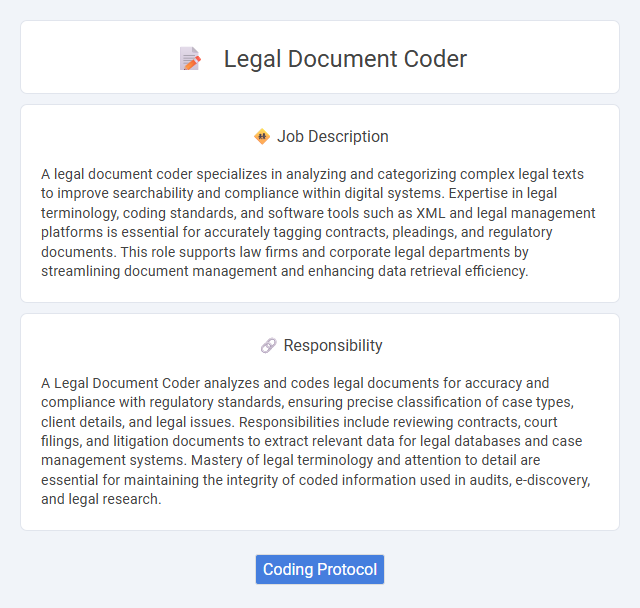
A legal document coder specializes in analyzing and categorizing complex legal texts to improve searchability and compliance within digital systems. Expertise in legal terminology, coding standards, and software tools such as XML and legal management platforms is essential for accurately tagging contracts, pleadings, and regulatory documents. This role supports law firms and corporate legal departments by streamlining document management and enhancing data retrieval efficiency.
Individuals with strong analytical skills and attention to detail are more likely to excel as legal document coders, as accuracy in categorizing and interpreting legal texts is essential. Candidates who enjoy working independently and can maintain focus for extended periods may find this role particularly suitable. Those who struggle with repetitive tasks or lack familiarity with legal terminology might face challenges adapting to the job's demands.
Qualification
A Legal Document Coder must possess strong analytical skills and expertise in legal terminology, often requiring a background in law, paralegal studies, or legal transcription. Proficiency with coding software and data entry tools is essential to accurately classify and process legal documents. Attention to detail and familiarity with compliance standards, such as HIPAA or GDPR, enhance the coder's ability to maintain document security and integrity.
Responsibility
A Legal Document Coder analyzes and codes legal documents for accuracy and compliance with regulatory standards, ensuring precise classification of case types, client details, and legal issues. Responsibilities include reviewing contracts, court filings, and litigation documents to extract relevant data for legal databases and case management systems. Mastery of legal terminology and attention to detail are essential for maintaining the integrity of coded information used in audits, e-discovery, and legal research.
Benefit
Legal document coder jobs likely offer competitive salaries due to the specialized knowledge required in both law and coding. Employees in this role probably benefit from flexible work arrangements, as many legal firms and organizations support remote or hybrid schedules. Opportunities for career advancement and professional development may be common, given the growing demand for digital expertise in legal documentation.
Challenge
Legal document coder roles often involve the challenge of accurately interpreting complex legal terminology and ensuring precise coding to maintain data integrity. The probability of encountering ambiguous or inconsistent language requires strong analytical skills and attention to detail. High-pressure deadlines may also increase the difficulty of maintaining accuracy under time constraints.
Career Advancement
A Legal Document Coder specializes in accurately classifying and coding legal documents using standardized coding systems, enhancing data retrieval and case management efficiency. Career advancement opportunities include progressing to senior coding specialist roles, legal data analyst positions, or transitioning into legal compliance and regulatory affairs. Mastery of legal terminology, advanced coding certifications, and proficiency in legal software significantly boost prospects for promotion and salary growth.
Key Terms
Coding Protocol
Legal document coders ensure precise application of coding protocols by accurately interpreting legal texts and assigning standardized codes to enhance data retrieval and analysis. Mastery of coding protocols, including adherence to confidentiality and compliance standards, optimizes document organization and legal research efficiency. Proficient coding supports case management systems by enabling seamless integration of legal documents into digital databases.
 kuljobs.com
kuljobs.com